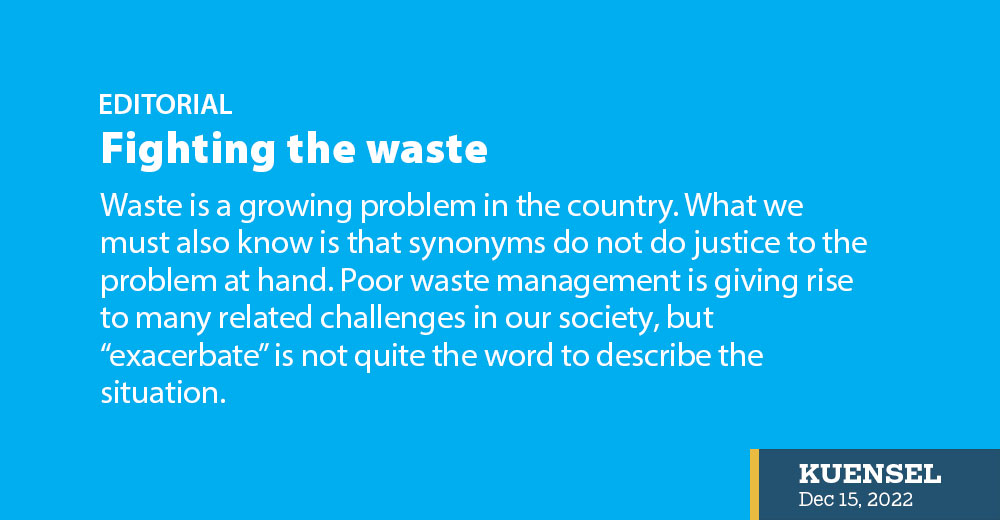Waste is a growing problem in the country. What we must also know is that synonyms do not do justice to the problem at hand. Poor waste management is giving rise to many related challenges in our society, but “exacerbate” is not quite the word to describe the situation.
With a growing population, urbanisation, and poor management systems, Bhutan is today faced with one of the biggest problems that can, tackled with resolve, be solved easily. We are small and our problems are small, too—that’s talking about issues such as poverty, water shortage, and waste, among others.
We launched the waste management flagship programme on June 2, 2019 and the 12th Plan gave special emphasis to waste management.
The overall objective is to achieve “Zero Waste Bhutan” by reversing the landfill disposal rate from over 80 percent to less than 20 percent with measures such as source segregation; provision of downstream facilities such as waste collection facilities and drop-off centres at convenient locations; efficient and timely collection; proper storage and transportation systems; functional material recovery facilities, and sanitary landfills; and incineration plants for hazardous and residual waste.
What we see, however, is this: Over 300 street litter bins have been procured for waste segregation in public places and a total of 25 waste collection facilities and nine drop-off centres in Thimphu are fully operational. Further to that zero waste Bhutan App has been developed and penalties are imposed on offenders.
As we shape our new image, we must tackle the issues that deeply injure Bhutan’s true picture. At a time when Bhutan is being recognised as an environment-conscious country, the amount of waste flying around is ironic, and frankly, toe-curlingly embarrassing.
Bhutan’s population is small. Considering in the right perspective, more than half of the country’s population lives outside of the growing towns and cities. Why is waste still a growing problem?
Is waste an issue of serious concern because a large number of our people are uneducated? No. Waste is a problem because we could not make it a culture to care.
Waste deserves sober treatment because more than laws, rules, and regulations, we need practical solutions. How could we not, for example, stop people from smearing walls with lime just because Bhutanese have a penchant for doma?
If smearing lime on the wall is made a crime, shopkeepers and building owners will be more careful to not let such antics run riot. As simple as that! Every individual will be mindful of what they pick and discard.
To address the problem of waste in Bhutan, fines and penalties will work; the heavier the fines, the cleaner the towns and cities will be.
The Waste Management Committee has been carrying out a door-to-door awareness campaign on waste segregation between Dechencholing and Ngabirongchhu in South Thimphu. This initiative must go nationwide.
Mindless disposal of waste should be considered a serious crime if we are to effect a serious and noticeable change in waste management.


